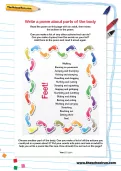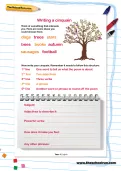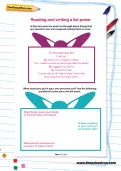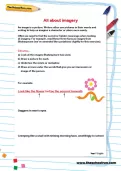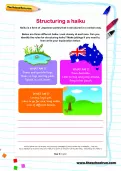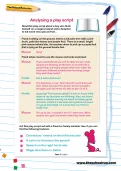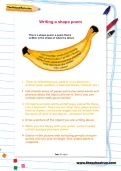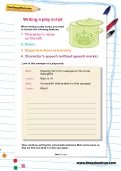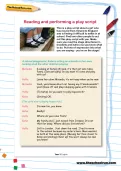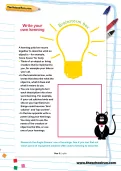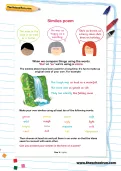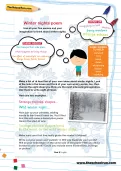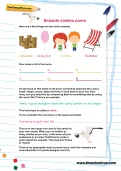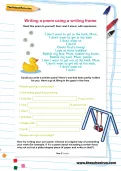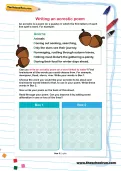Read this play script about a boy who finds himself on a magical island and is tempted to eat some very special fruit, then act it out with a family member. Can you find the following features in the play script?
or
Register to add to your saved resources
Already a subscriber? to view this content.
A shape poem is a poem that is written in the shape of what it is about. Think of something you want to write about (an animal, food, weather, a haunted house, a forest, etc.) Get a blank piece of paper and write some words and phrases about the object all over it. See if you can include some really good similes! Choose your best words and phrases and write these into a few lines. There are no rules! Your poem doesn’t have to rhyme, can be any length, can be written from the point of view of the object – whatever you like! Draw a picture of the object you are writing about. When you are happy with your poem, write it neatly into the picture you have drawn. Colour in the picture with colouring pencils (not pen as this will ruin your writing!). Your shape poem is complete.
or
Register to add to your saved resources
Already a subscriber? to view this content.
When writing a play script, you need to include the following features: 1. Character’s name on the left 2. Colon : 3. Stage directions in brackets 4. Character’s speech (without speech marks) Look at this example of a play script then continue writing the conversation between Mum and Louise so that we find out what is in the saucepan.
or
Register to add to your saved resources
Already a subscriber? to view this content.
This is a play script about a girl who has moved from Ireland to England and is finding it difficult to settle in at school. Find two other people to act out this play script with you. Make sure you read the stage directions (in brackets and italics) so you know what to do. Put lots of expression into what you are saying – you’re on the stage!
or
Register to add to your saved resources
Already a subscriber? to view this content.
In this worksheet, your child can complete a poem about snow by filling in the blanks. Repeat the exercise to come up with a few different poems.
or
Register to add to your saved resources
Learn all about kennings: practise using just two words words to create a highly descriptive image.
or
Register to add to your saved resources
Already a subscriber? to view this content.
This English worksheet will help to develop your child's skills of reading and understanding poetry. It encourages creativity and will help your child write in an imaginative and poetic way.
or
Register to add to your saved resources
A worksheet prompting your child to use descriptive phrases and rhyming words to write a riddle about an everyday object.
or
Register to add to your saved resources
Already a subscriber? to view this content.
A worksheet prompting your child to write a poem based on common sayings that they hear every day.
or
Register to add to your saved resources
Already a subscriber? to view this content.
A worksheet prompting children to look for words associated with time in a poem. They then need to sort these words into categories.
or
Register to add to your saved resources
Already a subscriber? to view this content.
A worksheet prompting your child to write some similes which they can then work into a poem.
or
Register to add to your saved resources
Already a subscriber? to view this content.
Use this worksheet to think of ingredients for a spell. This activity encourages children to write an imaginative poem and set their words and pictures out in an eye-catching way.
or
Register to add to your saved resources
Already a subscriber? to view this content.
This worksheet will give your child a starting point from which to write an imaginative poem. Encourages thinking about interesting description and text layout.
or
Register to add to your saved resources
Already a subscriber? to view this content.
A worksheet to encourage children to generate similes and then organise them into a poem.
or
Register to add to your saved resources
This worksheet encourages children to look at a piece of prose and improve it with their own phrases, before transforming the prose into a poem.
or
Register to add to your saved resources
Already a subscriber? to view this content.
This worksheet shows children how to structure a haiku and then gives them prompts on how to write their own.
or
Register to add to your saved resources
Already a subscriber? to view this content.
This poem encourages children to write a poem about something that they often make a fuss about. They are given a writing frame to support them.
or
Register to add to your saved resources
Already a subscriber? to view this content.
A worksheet encouraging children to think of ideas and then structure them into an acrostic poem.
or
Register to add to your saved resources
Already a subscriber? to view this content.
A worksheet encouraging children to read a limerick and think about its structure, then structure their own limerick.
or
Register to add to your saved resources
A worksheet giving prompts for children to think and write about the setting, structure and language of their favourite poem.
or
Register to add to your saved resources
Already a subscriber? to view this content.
